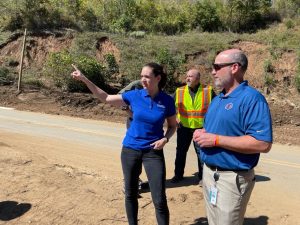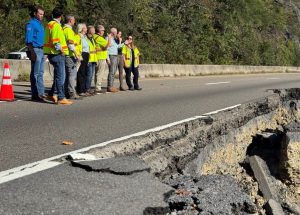
Kristin White ’10 speaks with North Carolina secretary of transportation. (Photo Credit: FHWA)
As soon as Hurricane Helene dissipated, members of the Federal Highway Administration (FHWA) were on the ground in areas most affected across the southeastern U.S., working shoulder to shoulder with federal, state, and local partners to aid in the recovery process. Leading these efforts was Acting Administrator and Mitchell Hamline alum Kristin White ’10. She spent last week in Tennessee and North Carolina, assessing the damage to transportation infrastructure and meeting with leaders and communities to figure out how to move forward together. “Our top priorities have been clear from the beginning: Keep people safe and rebuild communities,” she said.
To help with the immediate need of search and rescue, White’s team of 3,000 FHWA personnel across 52 states and territories prepared and activated their emergency response plans. People were stationed in Florida, Georgia, North Carolina, South Carolina, Tennessee, and Virginia, ready to enter communities as soon as it was safe to begin clearing roads and inspecting critical infrastructure.
After the recovery phase comes rebuilding. “We help states through the federal Emergency Relief fund so they have the resources needed to plan, design, construct, and maintain roads, bridges, and critical infrastructure,” White said. During her travels, White worked with response teams to assess the damage to I-40 and I-26, which are critical connectors in the region. As of October 5, the FHWA had provided over $130 million in “quick release” Emergency Relief funding to North Carolina, South Carolina, and Tennessee to help pay for the costs of immediate emergency work, with more funding to come.
“Transportation is one of the most critical services a government can and should provide,” White said. Without roads or bridges, those in need are unable to access clean water and food, hospitals, work, school, and emergency first responders. “Even now,” she said, “parts of this region remain disconnected due to roads and bridges being washed away in minutes.”

Kristin White ’10 assesses damage to I-40 alongside Tennessee state leaders and officials. (Photo Credit: Tennessee Department of Transportation)
Once she was on the ground, the damage was shocking and, in western North Carolina, “nearly apocalyptic.” But, she said, “this is nothing compared to the lives lost and families still waiting to hear information on the missing.” In her travels, White met with the mayor of one of the small towns severely devastated by Hurricane Helene, who emphasized the critical need for transportation to connect with people in his community.
“It was a humble reminder that this work is so noble and honorable, and I wouldn’t have been able to serve in this way without the educational foundation and network of colleagues and friends I gained through Mitchell Hamline,” she said.
White came to law school after completing a year as a Fulbright Fellow in Japan. Upon graduating in 2010, she spent a stint with the city of Minneapolis before serving in various roles for over seven years with the Minnesota Department of Transportation. She moved to Washington, D.C., and worked for the Intelligent Transportation Society of America before joining the FHWA as chief counsel. She became deputy administrator in May 2024 before taking over as acting administrator in early September.
The FHWA’s mission—to deliver a world-class transportation system that is safe, efficient, sustainable, and equitable for all while growing the economy—fuels White in the work she’s doing, especially in these recent weeks. “It will potentially take months or years to rebuild, but our commitment is to keep people safe and help communities build back better,” she said.
“That’s one thing I noted in talking with families and first responders: There is resilience and strength, even in the aftermath of a devastating storm, that brings people together to serve the public good.”
